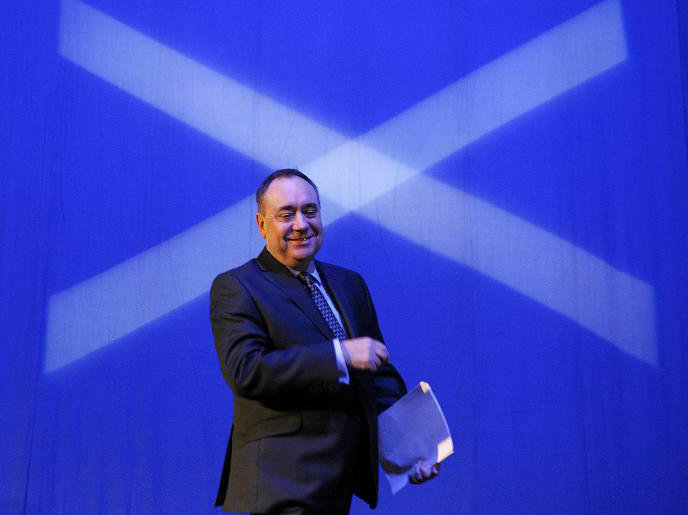The Scottish National Party (SNP) has gone from being a fringe force to within touching distance of taking Scotland independent from Britain, its defining purpose, in 15 years.
The SNP has driven the campaigns first for a referendum and then for a “Yes” vote on September 18, when the country votes on whether to end the 300-year union.
To most Scots, the party means two things — First Minister Alex Salmond, the combative horse-racing fanatic who has led it on and off since 1990, and independence, at the party’s heart since its foundation 80 years ago.
Even if, as most opinion polls suggest, the SNP is defeated in the referendum, the party will still earn significantly more powers for Scotland.
The opening of the Scottish Parliament in 1999 under Britain’s then prime minister Tony Blair gave the SNP its big boost.
Initially the second biggest party behind Blair’s Labour, by 2007, Salmond was leading a minority government in Edinburgh which became a majority administration in a surprise election win four years later.
The SNP has used the power the parliament has to set Scottish domestic policy by introducing measures such as free care for the elderly.
Political commentators say it has a “big tent” approach to politics but tends to be centre-left on social issues and centre-right on the economy.
– Women turned off? –
The SNP’s core support comes from well-educated, middle class Scots, with strongest backing from older men.
This has prompted opponents to claim it struggles to attract women. Opinion polls suggest this is carrying through to the independence vote.
A YouGov poll released Tuesday, which showed the “Yes” camp closing the gap on “No” campaigners, indicated that while more women were backing independence, the figure fell short of overall polling.
Some 42 percent of women back independence against 58 percent who are opposed. This compared to 47 percent of all voters surveyed backing independence versus 53 percent wanting to stay in Britain.
This is despite Salmond’s deputy, Nicola Sturgeon, taking a major role on the campaign trail.
One woman set to vote “No”, Mary Dickie, told AFP in Glasgow that she was put off by Salmond’s “arrogant” manner.
James Kelly, who is leaning towards a “Yes” vote, added that he thought independence could bring more jobs to Scotland.
But of Salmond, the 60-year-old retired social care worker said: “He can’t give a straight answer.”
– ‘Accidental’ referendum –
Scotland is set to be granted greater devolved powers to set policy on domestic issues even if it votes “No”.
In a bid to weaken the case for independence, the British government passed a law in 2012 which will result in the biggest transfer of taxation powers to Scotland in 300 years if it votes “No”.
All three of Britain’s main political parties, including Prime Minister David Cameron’s Conservatives, have also pledged to devolve more powers on top of that.
The extent of these concessions is likely to depend on the size of the referendum “Yes” vote.
Hassan said the referendum was being held sooner than the SNP expected after the party won a surprise majority at the 2011 Scottish Parliament election and then faced pressure to deliver its defining policy pledge fast.
Win or lose in two weeks’ time, the SNP, with Salmond at its helm, will still have forced a fundamental redefinition of Scotland’s relationship with Britain.

COMMENTS
Please let us know if you're having issues with commenting.